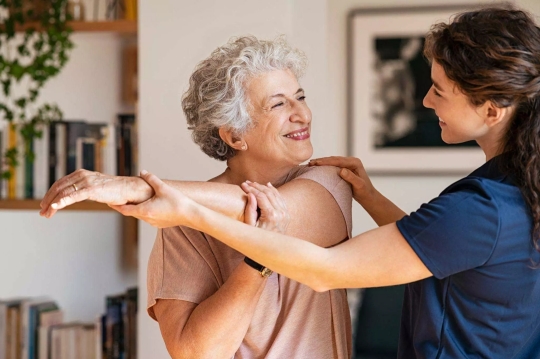
As we age, maintaining physical health becomes increasingly challenging. Aging often brings with it reduced mobility, weakened muscles, joint stiffness, and a higher risk of chronic conditions such as arthritis, osteoporosis, and cardiovascular diseases. These health concerns can significantly affect a senior’s ability to live independently and enjoy a high quality of life. This is where physiotherapy comes into play as a critical tool in senior health management.
Physiotherapy is a non-invasive, highly effective treatment approach aimed at improving mobility, strength, balance, and overall physical well-being. Through targeted exercises, manual therapy, and lifestyle guidance, physiotherapy can help seniors maintain their independence, reduce pain, prevent injuries, and manage chronic conditions. Let’s take a closer look at the essential role of physiotherapy in managing senior health.
Improving Mobility and Flexibility
One of the most common complaints among seniors is the loss of mobility and flexibility due to aging. Joint stiffness, muscle weakness, and reduced range of motion can make everyday tasks like walking, standing up, or climbing stairs increasingly difficult. Physiotherapy addresses these issues by incorporating mobility exercises designed to increase flexibility and movement. Gentle stretching, joint mobilization, and specific strengthening exercises are customized for each individual’s needs.
Through consistent physiotherapy, seniors can regain their freedom of movement, making it easier for them to perform daily activities without assistance. This helps promote independence, which is crucial for mental and emotional well-being as well.
Pain Management
Chronic pain, especially in areas like the back, knees, shoulders, and hips, is prevalent in older adults. Conditions like arthritis, spinal degeneration, and osteoporosis can cause persistent pain that limits activity levels and reduces overall quality of life. Physiotherapy offers various pain management techniques that reduce reliance on pain medication and improve long-term outcomes.
Treatment modalities such as manual therapy (including massage and joint manipulation), heat and cold therapy, and therapeutic exercises are often employed to alleviate pain. Physiotherapists may also teach patients how to manage their pain through posture correction, body mechanics, and ergonomics to reduce strain on affected areas.
Fall Prevention and Balance Training
Falls are a major concern for older adults and can lead to severe injuries such as fractures or head trauma. In fact, falls are one of the leading causes of hospitalization among seniors. Loss of balance, muscle weakness, and impaired coordination are common age-related factors that increase the risk of falls.
Physiotherapy plays a crucial role in fall prevention by providing balance training and exercises that improve coordination and muscle strength. Seniors who undergo regular physiotherapy sessions develop better body awareness and reaction time, making them less likely to fall. Therapists may also assess the home environment to recommend safety modifications and teach seniors how to use assistive devices such as walkers or canes safely.
Management of Chronic Conditions
Many seniors suffer from chronic conditions like arthritis, diabetes, cardiovascular disease, and respiratory issues, all of which can impair their physical abilities and overall health. Physiotherapy offers a tailored approach to managing these conditions by helping seniors stay active, reducing symptoms, and preventing further deterioration.
For example, seniors with arthritis can benefit from exercises designed to strengthen the muscles around the affected joints, improving function and reducing pain. Those with cardiovascular conditions may engage in safe aerobic exercises that enhance heart health without overexertion. Physiotherapy is also valuable for respiratory conditions such as chronic obstructive pulmonary disease (COPD), where breathing exercises can improve lung capacity and reduce shortness of breath.
Post Surgery Rehabilitation
After surgeries, such as hip or knee replacements, physiotherapy is essential for recovery. Senior patients require specialized care to help them regain their strength, range of motion, and independence following surgical procedures. Physiotherapists guide them through rehabilitation exercises that gradually restore their physical capabilities while minimizing pain and discomfort.
Post-surgery physiotherapy also reduces the risk of complications, such as blood clots and infections, by encouraging movement and improving circulation. This personalized rehabilitation process ensures that seniors can recover safely and efficiently while resuming their regular activities sooner.
Enhancing Mental Health and Well-Being
Physical health and mental well-being are closely interconnected, especially in seniors. Reduced mobility and chronic pain can lead to feelings of frustration, depression, and social isolation. Physiotherapy promotes a sense of achievement and empowerment as seniors regain control over their physical health. The ability to move freely, participate in social activities, and maintain independence significantly boosts confidence and improves mental health.
Physiotherapists also foster supportive relationships with their patients, providing encouragement, motivation, and emotional support. This connection can play a crucial role in helping seniors stay committed to their health goals.
Improving Cardiovascular Health
Physical activity is essential for maintaining cardiovascular health, especially for seniors. Regular exercise helps regulate blood pressure, improves circulation, and reduces the risk of heart disease. However, many seniors may find it difficult to engage in vigorous activities due to joint pain, muscle weakness, or other age-related health concerns.
Physiotherapy offers gentle, supervised exercises tailored to each senior’s fitness level, ensuring that they can engage in heart-healthy activities without strain. Low-impact exercises, such as walking, cycling, or water aerobics, are commonly incorporated into physiotherapy programs to help seniors stay active while protecting their joints and muscles.
Conclusion
Physiotherapy plays a pivotal role in senior health management by addressing the physical and functional limitations that come with aging. Through personalized treatment plans, physiotherapy helps seniors improve mobility, manage pain, prevent falls, and enhance their overall quality of life. The benefits extend beyond physical health, positively impacting mental well-being and emotional resilience.
For seniors, physiotherapy is not just a treatment option it’s a way to maintain independence, stay active, and enjoy a fulfilling life. If you or a loved one is facing the challenges of aging, IVORY PHYSIOTHERAPY CLINIC offers home care physiotherapy in Seawoods, providing expert care right at your doorstep to support better health and long-term well-being.







